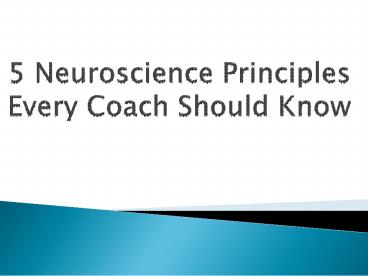5 Neuroscience Principles Every Coach Should Know - PowerPoint PPT Presentation
Title:
5 Neuroscience Principles Every Coach Should Know
Description:
The complexity of brain-based coaching is reduced to the triggers and interventions that produce the most dramatic improvements for your clients in Introduction to Coaching with Neuroscience. – PowerPoint PPT presentation
Number of Views:32
Title: 5 Neuroscience Principles Every Coach Should Know
1
5 Neuroscience Principles Every Coach Should Know
2
- Neuroplasticity is the term used to describe
the concept of brain change, which is now well-
established in neuroscience. A large body of
neuroscience evidence suggests that our brains
remain changeable (or malleable) throughout our
lives. - Seven principles of neuroscience every coach
should know. - 1. Nature and nurture both triumph.
- In Brain Based Coaching, both heredity and
the environment interact to shape our
brains and impact our behavior. - Therapy or coaching can be viewed of as a
systematic and purposeful 'environmental tool'
for change that can help shape neural pathways - 2. The brain changes as a result of experiences.
- The prefrontal cortex, amygdale, and
hippocampus, which are connected with emotions
and memories, are not hard-wired they are
'plastic.' In reaction to the experiences it has,
the brain prunes and adjusts its connections.
3
- 3. Emotion is at the root of memory development.
- Emotions and memories are linked brain
processes. - The amygdale, which regulates emotional
arousal, also controls neurotransmitters that aid
memory consolidation. Emotional excitement has
the ability to stimulate the amygdala, which
regulates memory storage. - You can also get Training on the Law of
Attraction Training in India. Because now a day
everybody need of Coach. - 4. We aren't always aware of what our minds are
'thinking.' - Unconscious processes have a significant
impact on our thoughts, feelings, and behaviours
(though I'm not willing to put a number on how
much is subconscious). - Nonverbal and unconscious information can be
processed by the brain, and this information has
an impact on therapeutic and other relationships.
It is possible due to Coaching with Neuroscience.
4
- 5. Change is built on the foundation of
relationships. - Positive change can be elicited by
relationships in both childhood and maturity. - Sometimes all it takes is one person's love,
care, or attention to help someone else change
for the better. - Client can use the therapeutic interaction
to change their brain systems and improve
their emotional regulation. - According to research, we create emotions from
a variety of factors, including our physiological
state, our reactions to the "outside"
environment, our experiences and learning, and
our culture and upbringing.































